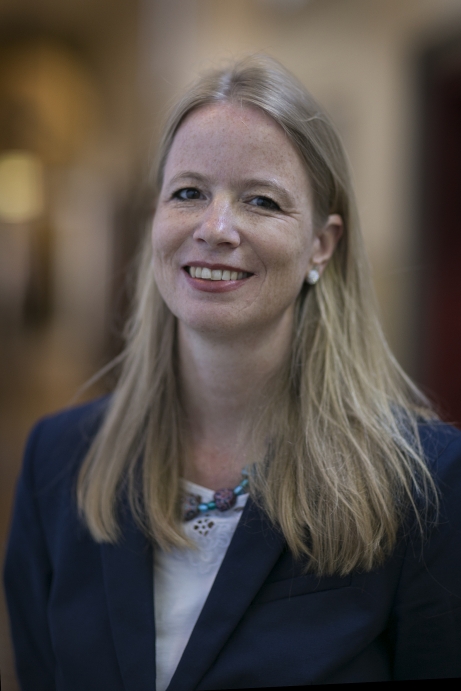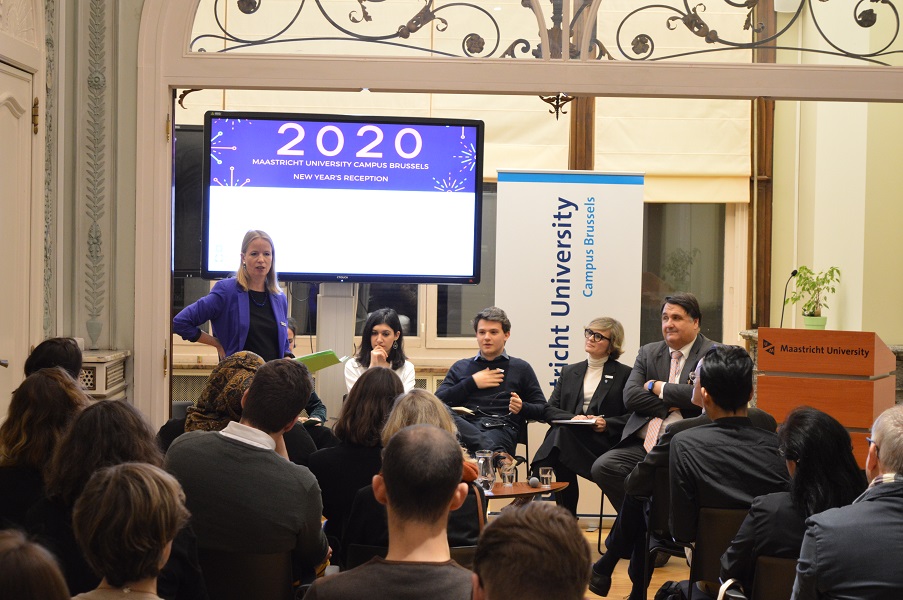Brexit’s long shadow
Professor of EU Democratic Governance and Director of Maastricht University Campus Brussels Christine Neuhold talks about the need for informed debate and how complicated it is to leave the EU – or be in it.
Brexit – a very brief history
While several parties in the latest UK election promised a second referendum, reconfirmed prime minister Boris Johnson’s Conservatives won an overwhelming mandate to “get Brexit done” (terms and conditions apply; look up “first-past-the-post” for details). That means that the UK will leave the EU on 31 January. Only this time, they actually will.
How did we get here? On 23 June 2016, Britain votes to leave the EU, whereupon David Cameron, who had called the referendum, steps down as prime minister. His successor Theresa May triggers ‘Article 50’ on 29 March 2017, starting a two-year countdown to the UK leaving the EU. She announces a snap election soon after and promptly loses her parliamentary majority.
The much-covered negotiations between UK and EU officials do not actually concern the post-Brexit relationship but a withdrawal agreement on the terms of departure, accompanied by a political declaration guiding the negotiations on future ties. Due to infighting and the election results, parliament rejects May’s transition deal several times by historic margins.
Independence Day comes and goes; May asks for an extension until 30 June 2019, then another one until 31 October 2019. She eventually resigns and Boris Johnson wins the ensuing leadership election. He belligerently proclaims he would rather be found dead in a ditch than ask for another extension; then asks for another extension until 31 January 2020 – which brings us to today.

This time actually happening: Brexit
Now the negotiating begins
So what happens now that Brexit is done? “It’s not done at all…” says Christine Neuhold. “The process of negotiating the future relationship now starts but that doesn’t necessarily mean that the UK will leave by the end of the year; the transition period could still be extended beyond the end of the year by 30 June. The UK have ruled this out but we will see what actually happens.”
Until the end of the year, the EU-UK relationship will remain largely as is in practical terms but politically a lot will change. “As of 1 February, the UK loses membership of EU institutions. Of the 73 seats becoming available in the European Parliament, 27 will be redistributed among member states, 46 will be left for possible enlargement. The UK had already declined to send a Commissioner to the European Commission.”
“The UK has had a profound influence on the direction of Europe and on the way its institutions are run,” says Neuhold. “British career diplomats in Europe have long had a reputation as being incredibly well prepared, experienced and very tough negotiators – so everyone else had to up their game too.” Despite their absence, the UK’s impact and legacy will still be felt.
Brexit will cast a long shadow
Conversely, Neuhold thinks, “Brexit will cast a long shadow on the UK’s future.” The influence on domestic politics has been profound, from the last general election being treated as a referendum on the original referendum to the news agenda and Westminster having been dominated by the topic for three years now. “It’s naive to think you can easily disentangle yourself from an institutional and legislative apparatus that has grown over decades.”
Europe will feel the impact too. “The different parties from the UK were propping up pan-European alliances that will now be weakened. In general, the UK were wary of European integration as well as environmental and social standards imposed by the EU; their foreign policies are very much aligned with US interests. All of these things will shift a little, now that such an influential partner has left.”
Neuhold says that, at least in the EC, the dust has somewhat settled after three years of frantic preparation. “I still think that the political impact will be greater than we can anticipate at this point.” The same goes the other way around. Like almost every other commentator, she thinks the narrative of uncomplicated free global trade deals propagated by the Brexit campaign is facile and misleading.
False figures and a lack of nuance
“It’s extremely difficult to follow thousands of pages of trade deals to the letter – let alone negotiate them.” Neuhold also points out how selectively politicised trade deals are. “When we protest against TTIP, what are we actually against? All of it? Certain paragraphs? A general tendency? It’s impossible to convey these things to the public in simple terms…”
That is why she thinks the referendum was such a bad idea in the first place. “It is good to be critical, but the answer is more information and nuanced debate. If I assigned a question like that to my students, I would be worried that they only had 6,000 words to express their verdict – but putting it in yes/no terms is just politically irresponsible.”
While the EU has averted an institutional crisis – if anything the remaining partners have moved closer together and Euroscepticism has lost steam now that it’s becoming clear how daunting an enterprise leaving the EU actually is – Neuhold thinks the European institutions have missed a chance to start a proper dialogue and address the perception that it is undemocratic.

Christine Neuhold is Professor of EU Democratic Governance. She is Director of the Research Programme of Politics and Culture at the Faculty of Arts and Social Sciences (FASoS) at Maastricht University and Director of Maastricht University Campus Brussels.

Better communication
She remembers a leaflet she received in 2005 detailing the benefits of the Constitutional Treaty. “At that point, I had studied European issues for more than 10 years but even I struggled to relate to the benefits outlined there.” The treaty was rejected in referendums in France and the Netherlands – without the desirable level of informed debate – and then rebranded as the Lisbon Treaty and ratified.
“The takeaway from Brexit shouldn’t be that it’s scary to leave. We should make tangible the benefits of EU membership – from roaming costs to freedom of movement; all the things you enjoy in daily life but never appreciate. For example, I’m an Austrian working for a Dutch university and live in Belgium and have two French-speaking children – that would have been incredibly difficult without all of those structures in place.”
Does she think nuanced debate stands a chance against demagoguery? “You can at least try to come together and be persistent in trying to make a difference. In any case, the European institutions can try to extend the practical benefits that academics like me have enjoyed to as many people as possible and do even more to communicate the up-sides to EU integration.”
Also read
-
According to sociologists Rolf van der Velden and Arie Glebbeek, education is in a deep crisis. More and more people are pursuing higher education in order to stay ahead of the rest, creating a veritable education race. Changes in education policy are not going to sufficiently turn the tide, the two...
-
Maastricht, Seattle, London, The Hague, Brussels, Maastricht: his career has taken a roundabout route so far. But for Davy Pieters (41), returning ‘home’ after an international career felt like coming full circle.
-
It is a problem that will not disappear with a one-size-fits-all solution, says NUTRIM professor Gijs Goossens in L1 interview.

